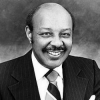Louis Stokes

Louis Stokes
Louis Stokeswas an attorney and politician from Cleveland, Ohio. He served 15 terms in the United States House of Representatives – representing the east side of Cleveland – and was the first black congressman elected in the state of Ohio. He was one of the Cold War-era chairmen of the House Intelligence Committee, headed the Congressional Black Caucus, and was the first black on the House Appropriations Committee...
NationalityAmerican
ProfessionPolitician
Date of Birth23 February 1925
CountryUnited States of America
There are, in the King case in particular, e names of confidential informants, persons to whom we promised confidentiality in return for their testimony. We have put their testimony in the public domain, but feel that their names should continue to be anonymous.
Nowhere, absolutely nowhere, has there ever been a hint, not even a whisper, that a Black person was involved in the assassination of the president. But that's the kind of thing you have in this movie.
Firstly, we have personnel records of persons we hired, persons we fired, reasons we fired them and so forth. These records have nothing to do with the assassination of the president and, therefore, ought to remain in the files.
There is one instance that we cite in the report where in one of the conversations a member of organized crime is talking to another member of organized crime and he suggests that Attorney General Kennedy should be murdered.
There have been a couple of instances prior to now where members of the House have filed resolutions calling for release of the sealed files which were developed during the course of our committee's investigation.
Now the interesting thing about the movie is that many of the questions it raised about the Warren Commission and its investigation were all investigated by our committee 13 years ago. We published our findings in 27 volumes of information and evidentiary material.
Well we had nine top forensic pathologists from across the country, who operated as a panel, who looked at all the ballistic evidence and they came out saying that those bullets did exactly what the Warren Commission said they did.
There was a man who was an associate of jimmy Hoffa, who testified against Hoffa in his trial down in Tennessee. We had information from him that he and Hoffa did, in fact, discuss the planning of an assassination conspiracy against Bobby Kennedy.
Our findings with reference to organized crime was that organized crime as an entity didn't participate in the assassination of the president. However, we were unable to preclude the possibility of individual members of organized crime having participated.
The purpose of sealing the records was not to conceal them or to conceal the facts from the American people.
In my opinion, assassination theories will continue to revolve around these assassinations as they have around several other significant assassinations in American history. The assassination of President Lincoln comes to mind.
There are, in the King case in particular, some names of confidential informants, persons to whom we promised confidentiality in return for their testimony. We have put their testimony in the public domain, but feel that their names should continue to be anonymous.
The purpose of the investigation was to bring out all relevant facts and to keep innocent people from being harmed by unsubstantiated reports.
And the evidence clearly showed that Ray was in the boarding house and the bathroom from which the shots that killed Dr. King were fired.